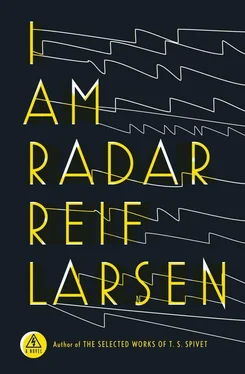“I probably shouldn’t have shown you this,” he said quickly.
“No—” she said, but he was already reaching for the pages. Their fingertips brushed against one another. A shot ran through her arm.
“Are you all right?” he said.
“I don’t know.” She suddenly felt ill.
“You don’t look well.”
He came around the desk and took her wrist in his hand. Two fingers pressed at her pulse. There was certainty in that touch, manifested from a lifetime of expertise. He was counting in his head. The skin where he was touching her felt as if it were burning. She let him lift her chin. He shined a light into her eyes. Her head swam. Something stirred between her legs.
He was old enough to be her father. Older. And yet. .
“I’m fine,” she said, pushing him away. “Really, I’m fine.”
She was in such a state that she did not remember the rest of their visit, but as she was leaving with Radar in her arms, still caught in a murky farrago of desire, the doctor put a hand on her shoulder. Again, that heat. Her pulse, beating.
“One more thing,” he said.
“Yes?”
“I’m going to need a quart of your husband’s blood.”
“A quart?” she said.
“I assure you, it’s nothing personal. We simply must look at every possibility.”
• • •
BACK HOME in their apartment, for the first time in more than three years, she stared at the jumble of books on her shelves. She wiped a layer of dust from her abandoned copy of Anna Karenina . It was the 1965 Modern Library hardcover edition. A copper stain like a half moon along the fore edge. She opened the book and read the first few lines, smelling the faint tendrils of mildew trapped within its spine, but she felt none of the same electricity that the doctor’s facsimile had elicited in her. She slid the book back into its empty slot and scanned the rows of forgotten titles. The French Lieutenant’s Woman. Ada, or Ardor. Hopscotch. Why had she deserted them so completely? These books, once her lifeblood, had become a graveyard. She could not blame the books for everything that had gone wrong. The books were a smoke screen. The books gave only what they got.
She stood a moment more in front of the bookshelf, then she retrieved the copy of Anna Karenina again. She found her old typewriter beneath the bed, rolled a fresh page into the platen, and began to type.
• • •
WHEN ASKED, CHARLENE had always explained away her life as a series of false starts that finally had disqualified her from running the race. It was a convenient shorthand metaphor, though, like all metaphors, it was not quite true.
Since childhood, she had combated her low-grade neuroses with the infinite act of indexing. Unlike her older sister Vivienne, who had started dying her hair blond at thirteen and had safely married a Florida real estate mogul by the time she turned twenty-one, wiry, pale Charlene had grown up uncomfortable in her own skin, and yet she seemed to revel in this discomfort, no doubt due in part to a pervasive intellect that she had never quite been able to tame. At age nine, she began collecting obituaries from the New York Times, completely taken with the act of summarizing a life in only a couple hundred words. She collected classics of the genre—“Emilie Dionne, 20; Nun, Quintuplet”; “Marion Tinsley, 55; Checkers Champion Who Regularly Beat Men”—and then began to pen her own for (still living) neighbors, friends, and family.
“My little deaths,” she called them. “Mes petites morts.” (She had just started taking French, though she did not pick up on the sexual overtones of her declaration.) Such a morbid fascination had elicited a worried burst of letters from her teacher, until it was determined that this, like everything else, must be just a phase.
Charlene was a voracious, practically manic reader, and her bedroom in the attic had quickly filled with books that threatened to overrun the house. Her mother, Louise, the grammar instructor, recognized the imminent bibliographic chaos brewing above their heads. She warned her younger daughter about the dangers of disorder:
“When you can’t find something,” she said, “it may as well not exist.”
This pronouncement struck an elemental chord in young Charlene. She felt a great panic welling up just beyond the boundaries of her consciousness, so she asked her father to help her build floor-to-ceiling shelves in her bedroom. Charlene then took up organizing all of her books alphabetically by the author’s last name, an incredibly satisfying task that made her fingertips tingle with anticipation of the distinct order she was carving out of nothing. Except that when she was finished, the allure of such an index was swiftly overshadowed by the consequent hollowness of the system: the author’s name was divorced from what was actually taking place in the books themselves. The Age of Innocence, for instance, written by Wharton, E., was marooned on the very bottom shelf, which did not seem right at all. She set about discovering a new method of intimate organization that came as close as possible to mirroring the peaks and valleys of her own mind. In fact, she was chasing that same first tingle in the fingertips, a sensation she would never be able to quite replicate. Still, she searched. Painstakingly, over a period of months, she arranged and then rearranged the books using increasingly obscure criteria: first it was alphabetically by subject, then by character, then according to a much more mystical system based on how important each book was to her, a scheme that inevitably shifted daily and required constant tending. She even made a card catalog system for her collection of books and periodicals and created a ledger book with checkout slips for lending. Her mother offered to give her an old date stamper from school, but she refused, instead deciding to steal one from their local public library. It was by far the worst thing she had ever done, but it made her own library feel bona fide, legitimated by an act of petty larceny. When it was finally all ready to go, she put posters up at school touting the grand opening of the Volmer Collection Privée. This was what she called it, thinking herself quite grown up for knowing a French word like privée . On Saturday, she set up a desk by her bedroom door and waited for the people to come explore her vast, perfectly organized collection privée .
But no one came. No one sought her advice for irresistible summer reads, for books that could change your life, for books that could make you cry, but in the way that we love to cry. No one came, least of all her sister, who viewed reading as a deplorable habit, akin to picking one’s nose. That afternoon, her mother ascended the stairs with a plate of chocolate chip cookies and checked out The Phantom Tollbooth, though Charlene could tell she was not going to read the book and was just doing it so that the ledger book would not stand empty.
“Where did you get this stamp?” Louise asked as Charlene checked her out.
“Your book is due in two weeks,” Charlene said, imprinting the card with great violence.
That evening, as she lay in bed reading The Scarlet Letter, Charlene realized she was relieved that the masses hadn’t come to pilfer her shelves. Society was the only threat to the sanctity of selfhood: an unpatroned library was an orderly library. Thereafter, lending privileges were suspended for everyone except herself, which was probably a good thing, for her methods of organizing the books continued to change until it was impossible for anyone except Charlene to find the book they might be looking for. Even she struggled with the logic of the system: somewhere in her library she lost her copy of The Scarlet Letter and never managed to find it again.
Читать дальше












